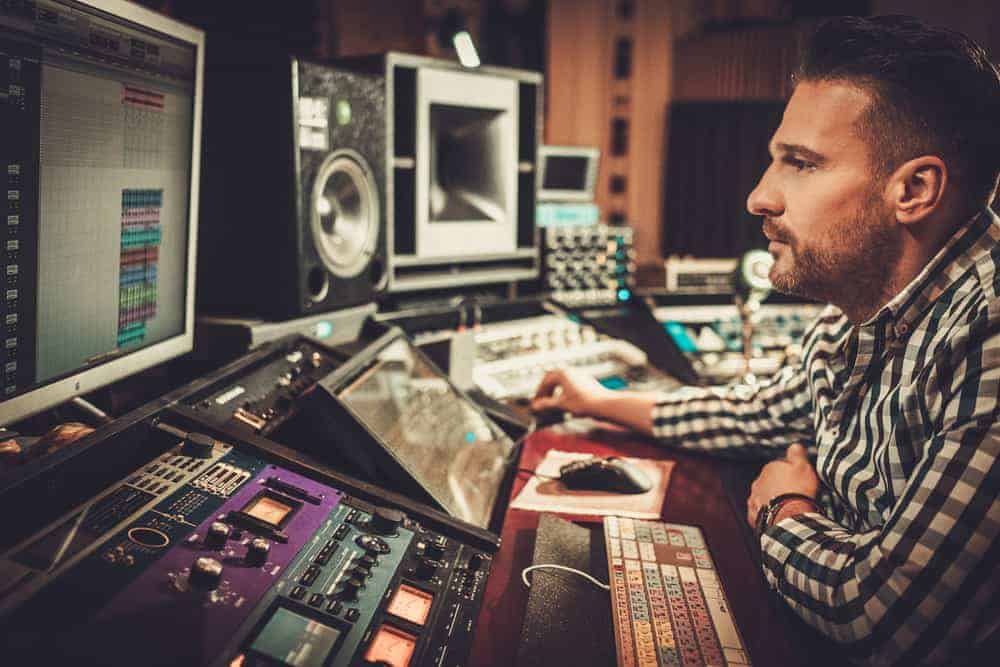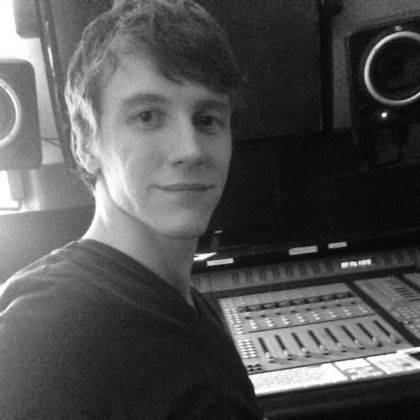Music Career Finder
Survey Start
Assistant Engineer

How To Become an Assistant Engineer
- Career Description
- Salary
- Career Outlook
- Career Path
- Experience & Skills
- Education & Training
- Additional Resources
- Sources
- References
Career Description
In the spirit of traditional apprenticeships, assistant engineers gain expertise in the recording field by working closely with a seasoned professional, providing essential support to the studio operations.
“An Assistant Engineer’s job is difficult to condense into a few words,” says Michael Duncan, a New York-based audio professional who currently works as an Assistant Engineer with some of the most well-known Recording Engineers in indie rock. “The position is basically centered around helping a Record Producer, Recording Studio Manager and/or Recording Engineer with anything studio-related.”
Though the tasks are often straightforward and the pay isn’t always great, the real value lies in the hands-on learning experience and the career advancement opportunities these apprenticeships offer. Assistant engineers are typically the first to arrive and the last to leave, always on hand to assist the lead engineer with a hodgepodge of duties before and during recording sessions.
“A typical day starts by arriving and leaving the studio before everyone else,” Duncan says. “During the session, you are at the beck and call of the person you’re assisting. Every day is different. Some days might be spent recording drums; other days might be spent labeling cables.”
But what do assistant engineers actually do?
Help Set Up the Studio for Recording
To ensure the studio is ready for recording, assistant engineers handle tasks like selecting, positioning, and testing microphones, setting up and checking amplifiers, organizing and labeling cords, and preparing the DAW so the engineer can just sit down and get to work right away.
Support During the Recording Session
During recording sessions, assistant engineers fine-tune microphone placements, resolve minor equipment issues, help musicians in their preparation, maintain detailed session logs, and run out for drinks and food for the crew.
“My job is to make sure that the person running the session has everything he or she needs (hopefully before they even ask for it),” Duncan says. “In more specific terms, that could mean positioning microphones, wrapping cables, carrying amplifiers, configuring the patch bay, tweaking outboard gear, arranging gobos, prepping mixes, printing stems, doing recalls, and more.”
The Do’s and Don’t’s of Assisting an Engineer
Let’s run through some do’s and don’t’s of being an assistant engineer…
Do’s of Assisting:
- Make sure all essential items (water, T.P., food) are ready before the session begins, even if an intern is assigned to these tasks.
- Be prepared to take over the session if needed, as unexpected circumstances may require the Head Engineer to leave.
- Actively listen to the music during the session, so you can offer input if requested (and only if requested).
- Prioritize tasks assigned by the Head Engineer, even if they involve seemingly menial chores.
- Respond to questions directed at you, but refrain from answering on behalf of the Head Engineer unless instructed.
- Maintain respect and professionalism towards the client, regardless of personal preferences.
- Stay productive during downtime by attending to tasks like cable management and equipment setup in other rooms.
- Occasionally offer compliments to the band or artist, but avoid excessive conversation to maintain focus on the session.
Don’t’s of Assisting:
- Avoid engaging in unnecessary conversation while on duty, as the client’s primary purpose is to record the music.
- Refrain from making the session about yourself – your role is to support the Head Engineer, not to showcase your accomplishments.
- Avoid questioning the Head Engineer’s methods during the session – any discussions about how things could be done better should happen after the client has left.
- Stick to the procedures preferred by the Head Engineer, as they are established to streamline the session’s workflow.
Expect To Work Long Hours
Long hours are often the norm, with shifts extending up to 12 hours and sessions frequently scheduled during evenings and weekends.
Yet, for many assistant engineers, the opportunity to gain experience, expertise, and valuable connections in this competitive field justifies the commitment. The work itself can oscillate between meticulous and repetitive tasks during downtime, punctuated by bursts of intensity driven by client budgets, scheduling constraints, and project objectives.
So be prepared to work a lot.
Salary
The average annual salary for Assistant Engineers is approximately $61,600. The salary range for Assistant Engineers runs from $46,000 to $90,000.
How Assistant Engineers earn income depends on the studio, its work culture, and its size. “Personally, I’m paid per project,” Duncan says. “Assistant Engineers at major studios are paid hourly or sometimes barely/not at all.”
Hey, what do you think about trying our new Music Career HelperMusic Career Helper really quick? It’s totally free and could help get your career moving fast! Give it a try. It’s totally free and you have nothing to lose.
Career Outlook
Competition for assistant engineer positions can be intense, making patience essential. Gaining experience as a studio intern or runner is a great way to get your foot in the door to eventually become an assistant engineer. On top of that, aspiring engineers should focus on networking and building relationships with industry professionals, who could provide valuable references or job leads.
In terms of finding work as an assistant engineer, audio professionals work when musicians book studio time. Audio professionals work when musicians book studio time. This depends on deadlines, budgets, and schedules, and can lead to some intense periods of work. “Assistant Engineers can work anywhere from twenty to eighty hours a week,” Duncan says. “Weekends and evenings are typical. Twelve-hour days are fairly standard.”
Career Path
Audio professionals generally begin as studio Interns, acquiring and refining the skills essential to assist in the studio along the way. After a successful internship, they can become Runners and work their way up to a role as Assistant Engineer. Once they’ve been in this role for a couple of years, it’s possible to graduate to a position as a full-fledged Record Producer or Recording Engineer.
If you’ve ever looked for an Assistant Engineer role at a recording studio, you already know competition for these jobs is stiff. “It’s very difficult,” Duncan says. “Ideally, you should start assisting or interning at a studio while you’re still in high school or early college. That will give you a decent head start. Also, try emailing Producers and Engineers that you admire to ask if they could use some help.”
- “Find a potential mentor. Email him/her.
- If you’re self-driven, don’t waste money on audio school. (Album credits are worth a lot more than a college diploma in this field.)
- Get real, tangible experience as early as possible.
- Listen to a lot of music, read a lot of books, and don’t stop learning.”
Experience & Skills
Truly effective Assistant Engineers have already spent several years in the classroom and in studio, learning the required technical skills to be able to assist in the recording process at a professional level. “To be a capable Assistant Engineer, you need to truly understand your role in the studio,” Duncan says.
“Your job is to keep the session running as smoothly as possible, but you’re not the person in charge of the session—you’re simply there to assist. Most importantly, you need to have a really firm grasp on the basics of audio engineering.”
Passion for music and recording are integral facets of an Assistant Engineer’s personality. Duncan says, “Working in a recording studio is not as glamorous as you might imagine. Repetition and long hours are the norm in this field. I’ve seen a lot of people become very lethargic in the studio, so you’ll want to make sure that you can handle the hours, first and foremost. Overall, you should be well-organized, reliable, knowledgeable, musical, personable, determined, and creative.”
Here’s a quick look at the skills you’ll need to succeed as an assistant engineer in a recording studio:
- Audio equipment knowledge: understanding how to operate, maintain, and troubleshoot various audio equipment like microphones, amplifiers, mixing consoles, and outboard gear.
- Digital audio workstations (DAWs): proficiency in using DAWs like Pro Tools, Logic Pro, Ableton Live, and others.
- Signal flow: a solid grasp of signal flow concepts and how audio signals travel through different components in the studio.
- Basic electronics: knowledge of basic electronics to handle minor repairs and maintenance tasks.
- Precision: ability to ensure all equipment is correctly set up and operational, maintaining high standards of audio quality.
- Documentation: keeping accurate session logs and notes.
- Time management: efficiently managing time to set up and prepare for sessions, often under tight schedules.
- Multi-tasking: handling multiple tasks simultaneously, from equipment setup to troubleshooting during sessions.
- Communication: clear communication with the lead engineer, musicians, and other studio staff to ensure smooth operations.
- Teamwork: working collaboratively with the recording team, understanding and anticipating the needs of the lead engineer and artists.
- Troubleshooting: quickly identifying and resolving technical issues that may arise during setup or recording.
- Adaptability: flexibility to adapt to changing circumstances and requirements during recording sessions.
Education & Training
Many Assistant Engineers begin their careers by enrolling at a music production school and learning studio skills as part of their coursework. Others find a way into the studio by training themselves as much as possible, then reaching out to recording professionals about internships or assistantships. Duncan advises, “If you’re serious about wanting to work in a studio, I would recommend finding a mentor.”
I’ve had three terrific mentors: Dan Romer, John Siket, and Andrew Maury. All of them have had great success in the industry and I’ve learned nearly everything I know from watching them work and asking questions when appropriate.
Additionally, there are a slew of terrific books available, including the Assistant Engineers Handbook by Tim Crich, Audio Engineering 101 by Tim Dittmar, Handbook for Sound Engineers by Glen Ballou, The Audio Expert by Ethan Winer, and the many recording/mixing handbooks by Bobby Owsinski.”
Additional Resources
Assistant Engineers never stop learning, and fortunately, there are many high-quality online resources available to audio professionals at all levels in their careers. Duncan recommends checking out the following: Audio Engineering Society, Society of Professional Audio Recording Services, SonicScoop, The Pro Audio Files, Pensado’s Place, Groove3, Lynda, Coursera, edX, CreativeLive, Mix with the Masters, SoundWorks Collection, Working Class Audio, Noise Creators’ podcast, and Berklee Online.
Sources

Michael Duncan
Michael Duncan is a Record Producer, Mixer, and Writer in New York City. He began his career interning at Headgear Recording and assisting Producer/Composer Dan Romer (Christina Aguilera, Beasts of No Nation.) He has also worked as an Assistant Engineer to John Siket (Sonic Youth, Yo La Tengo, Phish) and Andrew Maury (Atlas Genius, Ra Ra Riot, The Kooks). Duncan’s written work has been published by The A.V. Club, SonicScoop, The Pro Audio Files and more.
References
- 1. "Assistant Engineer Salaries in United States". Glassdoor.com. published: Dec 16, 2019. retrieved on: Dec 20, 2019